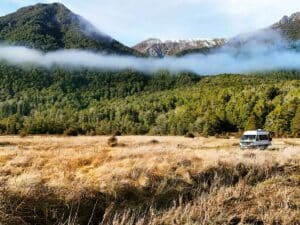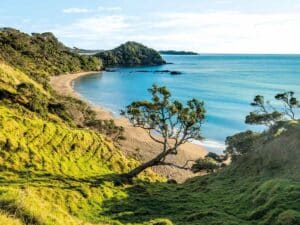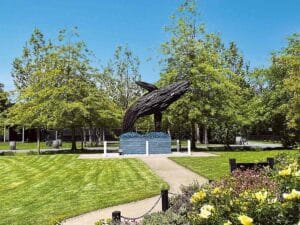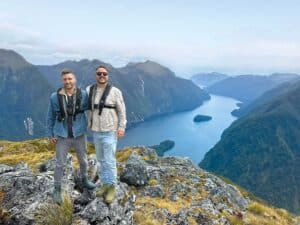Auckland. A word that, for most of us, is synonymous with noise, crowds and busyness – and let’s not forget: traffic jams! It’s probably no surprise that among all the RV-ers I've met, no one has ever mentioned our country's biggest city as their favourite destination.
For most of us, Auckland is the place where we might stop on our way through, with the intention of getting out as quickly as possible. But over the past two years, I’ve discovered another side of Auckland, one that I have grown very fond of.
I moved into my campervan full-time at the end of 2017, partly because I wanted to escape Auckland city life. I love the freedom that comes with living on the road and the chance to explore amazing new places. However, I do find myself back in Auckland regularly.
As much as I dislike the crowdedness and noisiness of the big city, Auckland is still home. Most of my friends are here, and so are most of my clients, and even though I can do a lot of work remotely, I do have to check in with them regularly.
In the beginning, I didn't really enjoy being back in Auckland – mainly because I didn't like the overnight parking spots on offer. The campgrounds are often unattractive, overcrowded and very expensive. The NZMCA parks are great, but Tui Glen in west Auckland fills up quickly, and Ardmore is quite a way out of the city.
However, my attitude towards RV-life in Auckland changed when I learnt about the camping and overnight parking options in Auckland’s regional parks. Discovering these amazing parks has completely changed my feelings towards being in the city.
So much so, that I now occasionally choose to stay in Auckland for a few extra days. Surprisingly though, many other RV-ers I have met on my travels don't know about the regional parks or have simply never considered them as destinations for their adventures.I thought it's time to change that.
The regional park network
Auckland has a network of 27 regional parks managed by the council. Eighteen of them offer camping and/or overnight parking for self-contained vehicles. If you are certified self-contained, you can find a regional park with overnight parking options in almost all parts of Auckland.
From Te Arai and Atiu Creek in the north to Craw Homestead and Log Race Road in the west, Shakespear, Long Bay and Ambury Farm in the centre, through to those in the Hunua Ranges and along the Firth of Thames in the south – and many in between.
I have now been to many of them, and they are all beautiful, well-kept parks often in idyllic locations. Many of them make you forget you're still in Auckland. For me, they are the perfect combination of being in nature, often right by the ocean, while still being close to the city.
My favourite parks
I have yet to find a regional park I don’t like. However, there are a few that stand out – for different reasons.
 |
Shakespear Park |
Shakespear Regional Park - Paradise at the tip of Whangaparaoa Peninsula
Shakespear has been a favourite of mine since long before I had my mobile home. I used to love coming up here just for day trips to enjoy the beautiful scenery and walks. The park is a fully fenced kiwi sanctuary, so if you go on a night-time walk, you might get lucky and spot one.
 |
Shakespear Regional Park |
The park has a certified self-contained (CSC) parking area and a full camp ground. Both are on the southern side of the park with beautiful views over the Hauraki Gulf towards the city. There are several beaches and many walks, and on a day with strong southerly winds, you can probably watch kitesurfers having fun in the bay in front of the campground – I might be one of them.
Ambury Regional Park
 |
Ambury Farm Park |
If ‘favourite’ is the park where I’ve spent the most time, then Ambury would definitely top the list. However, while I really like the park, this is mainly due to its closeness to the city. Located in Mangere Bridge, right on the edge of the Manukau Harbour, Ambury park is an operating farm, where you can get up close and personal with many farm animals.
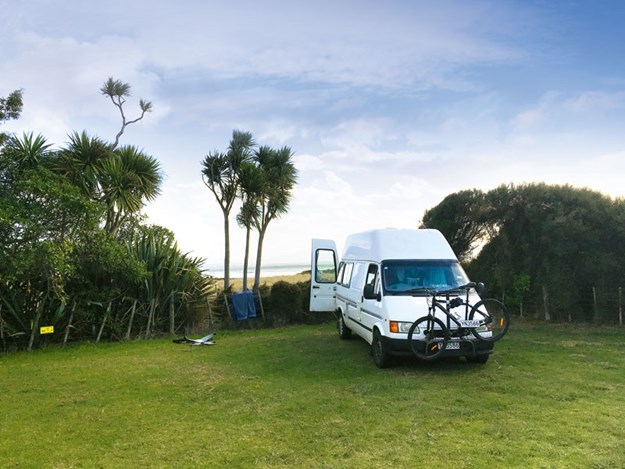 |
My favourite spot at Ambury Park |
The park has a campground suitable for both self-contained and non-self-contained vehicles and tents are also allowed. The campsite is basic with little shelter and only a long-drop toilet. However, there are proper toilets and showers by the main entrance gate (a 10-15 minute walk).
 |
Ambury Farm Park |
There are several beautiful walks through the park as well – I especially recommend the shorefront track. If you love animals and are looking for an idyllic, quiet place close to the city, this would be my top recommendation.
The North-East CoastParks: Te Ari, Tawharanui, Mahurangi, Wenderholm
I really wouldn’t be able to pick just one of them as a favourite because I love them all. Te Arai is the most remote and basic, with the overnight parking area (self-contained only) being part of the car park. But the beach is second to none, and if you are a surfer, you have a pretty good chance of finding a wave just on the other side of the dunes.
Tawharanui, Mahurangi and Wenderholm are all full campgrounds where tents are just as welcome as self-contained motorhomes and caravans. Facilities are still pretty basic, but the grounds are well kept.
All three are right by beautiful beaches and have a network of well-maintained walking tracks – often leading up to lookouts with stunning views. In Wenderholm and Mahurangi you will find CSC parking areas in addition to the main campground, which can be a quieter option during the busy summer months.
Log Race Road
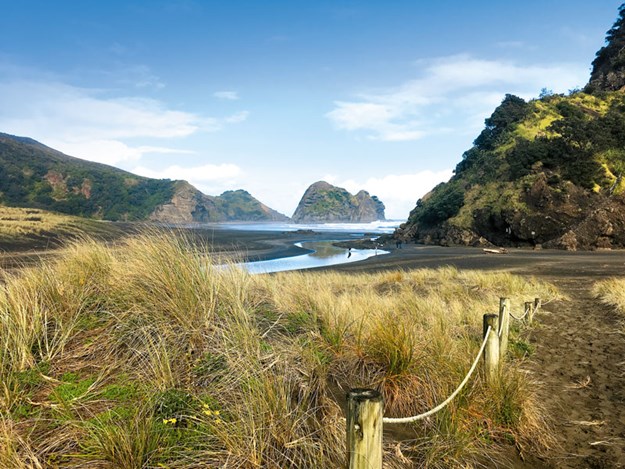 |
Piha Beach |
Log Race Road is essentially just a parking area south of Piha on the west coast of Auckland. This spot is definitely not going to win in the ‘best facilities’ category (there is only one basic toilet). But if you’re seeking a quiet spot with incredible views, look no further. On a good day, the sunsets are amazing. Make sure you visit Piha beach if you’re in the area.
Awhitu Regional Park - If you want to go remote
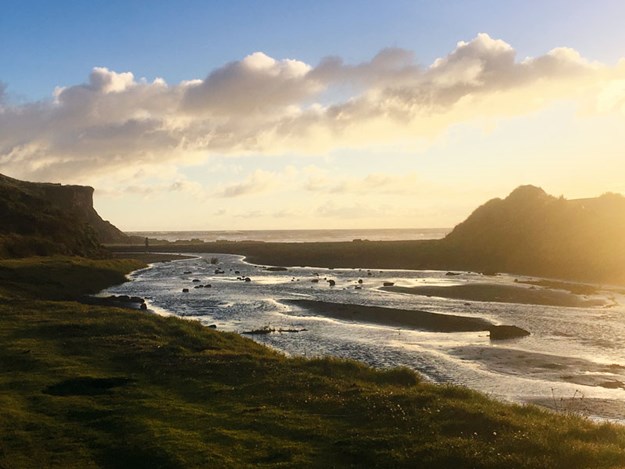 |
The west coast of Awhitu Peninsula |
It doesn’t get much more remote without leaving Auckland than Awhitu Peninsula and the Awhitu Regional Park. I have never been in summer, so I don’t really know how busy it gets. In spring and autumn, you can usually rely on finding tranquillity here.
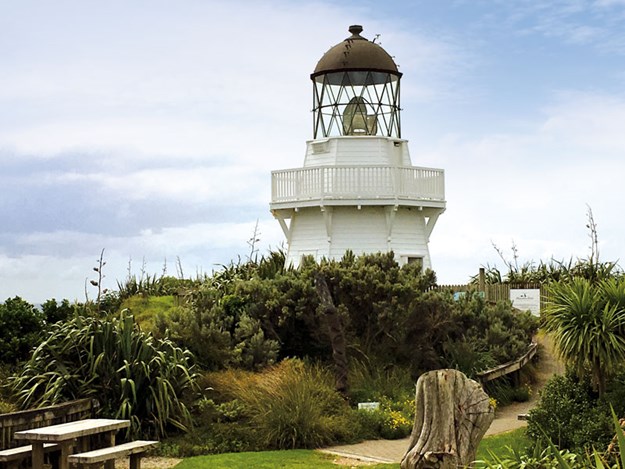 |
The Lighthouse - Awhitu Peninsula |
There are some lovely walks through the park, and I can also recommend visiting the lighthouse at the northern end of the peninsula. And while you’re there, be sure to spend some time at the freedom camping site at Hamilton’s Gap for beautiful black sand scenery.
Spoilt for choice along the Firth of Thames
Next time you’re heading north after a visit to the Coromandel (or south towards the Coromandel), why not take the scenic route and stop at one of the beautiful regional parks along the coast? None of these are very popular with tourists.
I wouldn’t be surprised if you found yourself alone here more often than not, outside of the busy summer months. I’ve visited all of them, but only ever spent the night at the Waitawa CSC Campground, which offers beautiful coastal views and several walking tracks.
Long Bay - In nature yet still close to the city
Long Bay Regional Park is another one I regularly visit because of its closeness to the city. There is no campground, only a CSC parking area. But there are public toilets, and if you park in the right spot, you get beautiful ocean views.
There is also a great walk up the cliffs at the northern end of the park. With it being only 30 minutes north of the city (without traffic), Long Bay is another excellent option if you want to stay central.
But be aware that on a nice weekend in summer, this park is super popular and you might struggle to get a spot at the CSC parking area until the crowds leave. The one downside with Long Bay is that you can only stay here for one night, which probably makes it more of a stopover spot than a destination.
Facilities, rules, costs
Facilities at the Auckland regional parks vary hugely but are overall more on the basic end of the spectrum. Some are only parking areas with long-drop toilets. while others offer drinking water, rubbish facilities and sometimes even showers.
However, none are comparable to the facilities you would find at a holiday park, and none have dump stations. Before you embark on a trip to any of the parks, check what facilities you will find, and prepare accordingly. Also, make sure you familiarise yourself with the individual rules in each park.
For some, there are restrictions on where you can park, and all of them have rules around how long you can stay. There are some parks where you are only allowed to stay for one night, while you can spend a week and more in others.
I've found the NZMCA and CamperMate mobile Apps very helpful, as well as the signage on site. Auckland Council also publishes a table with an overview of the parks and facilities. This is downloadable as part of the camping pass application form – See details towards the end of this article.
If in doubt, ask the ranger or call Auckland Council. Just as rules and facilities vary from park to park, so does pricing. It used to be between $8 - $16 per person per night, but it has recently been changed to per vehicle pricing, which includes two people.
As a result, it's now a minimum of $16 per night, even if you're a solo traveller, and up to $32 per night in some parks, including Ambury. While this is still affordable compared to many other options in Auckland, if you are planning to spend more than the occasional night in any of the regional parks, I would recommend the annual camping pass – see details opposite.
How to book
As you have probably figured out by now, I’m a big fan of the Auckland regional parks. However, if there is one thing I don’t like about the parks, it’s the last day in February (inclusive) and Muriwai Regional Park all year around.
You have to book over the phone when using an annual camping pass – which can be time-consuming. The council has told me they are working on making online booking available for camping pass holders so we might see this change soon.
The pass is valid from 1 September through to 31 August – no matter when you buy it. So if you buy yours in January, you only get six months but still pay the full price. In short, the annual pass is a great option for those who spend a lot of time in Auckland and are planning to use the parks regularly – especially outside of the busy summer months.
But there are limitations. booking system (that, and the recent steep price increases for solo travellers!). The council finally moved to an online system about a year ago (before, you could only book via phone).
This is a step in the right direction, but booking is still a lot more complicated than it could and should be. It can be tricky to find your park and navigate the system. But I've been told the council is continuously working on improving it, so who knows, it might be much better soon.
For now, you book via aucklandcouncil.govt.nz/ holidayplaces, select ‘Find accommodation in our parks’ and then work your way through the steps. The first time you book at any of the regional parks, you will have to create an account.
For future bookings, you then only need to log in. With the parks becoming more popular in summer, I would advise booking your summer getaways early. Outside of the school holidays, you can be a bit more spontaneous.
The annual camping pass
With prices between $16 and $32 per vehicle, the parks are among the more affordable options in Auckland. However, when you spend several weeks a year in Auckland, as I do, the cost still adds up pretty quickly. But the good news for frequent visitors is that there is an annual pass.
For $250 per year (as of 2019) per vehicle, which includes as many people as your RV is certified self-contained for, you can stay as many nights per year as you want. While Auckland Council has increased the price significantly this year (it used to be only $138 per year), this is still an excellent option for anyone who spends more than 10-15 nights in Auckland.
However, before you think this sounds too good to be true, there are a few limitations to be aware of:
- The rules around length of stay still apply. For example, if a park allows a maximum stay of three nights, you would have to leave for at least one night before you can come back.
- You cannot book in advance, only on the day you will arrive at the park. While this is certainly a limitation, I've only once not been able to book a park on the day because it was already full, and that was for Long Bay, where only 10 vehicles are allowed per night. However, during the busy summer months, this can be a serious limitation.
- The pass cannot be used at the popular East Coast parks (Tawharanui, Scandrett, Mahurangi, Wenderholm and Shakespear) from 1 December to the last day in February (inclusive) and Muriwai Regional Park all year around.
- You have to book over the phone when using an annual camping pass – which can be time-consuming. The council has told me they are working on making online booking available for camping pass holders so we might see this change soon.
- The pass is valid from 1 September through to 31 August – no matter when you buy it. So if you buy yours in January, you only get six months but still pay the full price. In short, the annual pass is a great option for those who spend a lot of time in Auckland and are planning to use the parks regularly – especially outside of the busy summer months. But there are limitations.
Where to learn more
- Learn more about the parks on the Auckland Council website and book your stay: aucklandcouncil.govt.nz/ holidayplaces
- Apply for an annual camping pass (the form to download also includes the overview table mentioned earlier): aucklandcouncil.govt.nz/parksrecreation/stay-at-park/Pages/getcamping-pass.aspx
- Call Auckland Council: 09 366 2000
- Auckland Council emergency number (for example, if you need to report something urgent in the middle of the night during your stay): 09 201 0101
- Use the NZMCA or CamperMate mobile apps to find parks and learn about the facilities available

